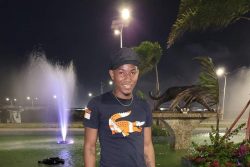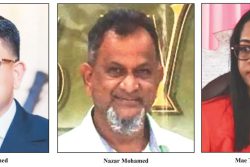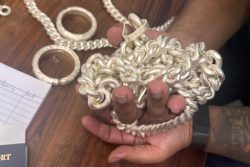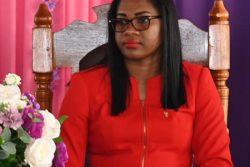The Parika Stelling will be upgraded by government to accommodate the necessary changes needed for the docking of the regional ferry and to enable it to be a transportation and logistical hub in the future.
“With the type of development in Essequibo, it becomes a very important major transport and logistics hub. I think the time has come for us to have a more holistic planning of Parika and what the stelling and that whole waterfront would entail, especially when you are talking about agro-processing, cold storage, farmers market, wholesale market… and the opening up to the islands [for tourism],” President Irfaan Ali yesterday said.
The President said that government will await the findings of the gap analysis to complete it but is fully committed to not only the regional ferry project, but ensuring local farmers have a proper area to export their produce.
“We are fully committed to this project. Guyana is fully committed to the regional ferry, we are fully committed to the expansion of markets in the region, fully committed to value-added processing, cold storage, the whole value chain when it comes to agriculture. This is going to be a sustainable national development a hundred years from now,” he said.
While visiting the small Esse-quibo farming village of Bona-sika, on Tuesday, Ali announced that the planned CARICOM ferry will operate from Parika.
The President had last week stated that technical assessments for the ferry service would be completed by the end of this month. He had also informed that the Guyana, Barbados and Trinidad and Tobago initiative saw the setting up of a “working group with ministers and the technical people.”
Together, they “have completed and are going through all the phytosanitary requirement items that we can start with. They’re examining the Guyana/Suriname model, in terms of the movement of vehicles, the insurance use, quarantine issues and all of these things, and a technical team will conclude an analysis as to the port facilities; what will be required to adjust the port facilities for the vessel to land,” the President explained.
On the assessment, he repeated that it was in its final stages. “We are waiting on the full assessment – because there is an assessment in Guyana Trinidad and Barbados and then they will see the types of changes [needed] at the port or whether a different vessel would be required. I see maybe in another four to five days, according to what Minister (Deodat) Indar told me, we should be able to see what that assessment brings out,” he said.
“We have to see what reconfiguration is needed. I don’t want to pre-empt. Whatever vessel is used, has to be also in Barbados, Trinidad and Guyana,” he highlighted.
Addressing the opening ceremony of the 12th annual Inter-American Development Bank (IDB) consultation with Carib-bean Governors, in February of this year here, Ali had said that he hoped the service would begin in about three months.
A high-level meeting was held in Trinidad two weeks prior, and all sides had two months for the completion of pre-clearance procedures for immigration, customs, and plant quarantine, and to make the ferry service a reality as soon as possible. The ferry will allow the movement of containers and passengers, with the potential to boost trade relations and advance food security efforts.
Ali has said that the aim is also to bring on board the regional private sector to implement similar initiatives to enhance areas of supply chain and logistics. “We have launched the first phase of this. In another two, or three months, that ferry will begin operations, and we are hoping that this will instil confidence in the private sector, and for the IDB investors, this is an excellent opportunity to bring a regional consortium together.”
He had told the IDB gathering that this venture signals the readiness of the three countries to take action to solve shared challenges in the Caribbean region. According to the head of state, this initiative falls under a joint slogan, which was dubbed “the coalition of the willing.”
“We are not waiting on everyone. Those who are willing to start an innovative project will go ahead, and the others will join when they are ready,” he stated.






